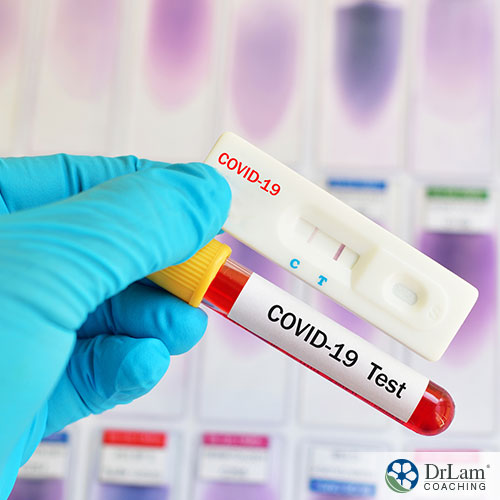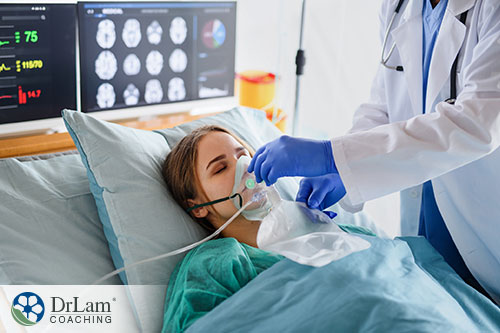With COVID-19 spreading across the globe, researchers and scientists work around the clock to find all of the information they can about the virus. One of the most recent efforts used to gather this information is an antibody test for COVID-19. Perfecting this kind of test will give scientists valuable information they can use to potentially develop a vaccine for the virus.
 Two primary tests for COVID-19 exist. One, called the polymerase chain reaction test (PCR), detects whether the virus’s genetic material shows up on a swab done on the nasal passages or throat. This test can determine whether a person currently suffers from the virus.
Two primary tests for COVID-19 exist. One, called the polymerase chain reaction test (PCR), detects whether the virus’s genetic material shows up on a swab done on the nasal passages or throat. This test can determine whether a person currently suffers from the virus.
The other type of test, serological testing, examines whether a person’s blood contains the antibodies for COVID-19 produced by the immune system. This article describes the antibody test for COVID-19.
Antibodies develop from your immune system’s efforts to fight the virus. If antibodies show up in an antibody test for COVID-19, that means you contracted the virus sometime in the past whether you were symptomatic or not.
One of the problems with any antibody test for COVID-19 concerns those with weakened or compromised immune systems, such as can occur in people with Adrenal Fatigue Syndrome (AFS). You may not produce these antibodies in the same way other people do.
Once you have COVID-19 it takes a few days to weeks for your immune system to produce antibodies. When the antibodies develop, they may last for a long time in your body (although only limited studies on this novel virus thus far).
If you show antibodies in your blood, depending on which type, that means you contracted the virus and your immune system successfully fought it off.
Several types of tests for COVID-19 currently occur in the effort to find a viable way to combat the virus. All provide different information about those who successfully survive the virus and how that information can be used.
This test is used on people who currently suffer from COVID-19. A nasal or throat swab gathers mucus that then goes through the PCR procedure to greatly amplify the genetic material of the virus if it is present. This tells whether the person actively has COVID-19 or not.
A potential problem with this test concerns how soon before the swab the person had contracted the virus. A few days typically pass after contracting the virus for it to begin multiplying in the throat or nasal passages. The test takes several days to get results because of the specialized equipment needed. In general, the PCR test proves the most accurate in diagnosing COVID-19 and is currently the most available way of testing.
A shorter version of the PCR test requires less time for results but may miss up to 30% of positive cases.
These two antibodies provide the basis for the antibody test for COVID-19. Immunoglobulin M shows the body's first reaction to a toxin such as a virus. Immunoglobulin G shows that you could have gotten the virus in the past.
 Both of these antibodies require a blood sample from a finger prick. It takes approximately fifteen minutes to get results. Accuracy for this antibody test for COVID-19 appears adequate, but 10-30% of the time the antibodies the test detects could be from another infection you contracted.
Both of these antibodies require a blood sample from a finger prick. It takes approximately fifteen minutes to get results. Accuracy for this antibody test for COVID-19 appears adequate, but 10-30% of the time the antibodies the test detects could be from another infection you contracted.
In addition, even if your blood does contain antibodies for COVID-19, it is not a clear indication that you are immune (you might still contract COVID-19 in the future).
At this point, only healthcare workers can administer this test appropriately. It should not be the only test used for diagnosing COVID-19.
The two main types of tests for COVID-19 are different in their purposes. The PCR and IgM test is designed to help diagnose whether you currently have the virus while the IgG test is designed to determine whether you had the virus in the past.
Numerous testing sites have been established for these tests. Check with your local health department to find the one closest to you. If you have symptoms or have had them recently, you may want to get this testing.
As mentioned above, a person with a weak immune system may not produce antibodies properly. Other potential problems regarding the accuracy of these tests also come up in discussions.
Some scientists express concern regarding the research behind the development of these new tests. Small sample sizes, disregard for the population samples come from, and the variation among people all figure into these concerns.
In addition, the possibility of the tests giving false negatives, meaning maybe you only had the virus for a short time or maybe you didn’t develop antibodies. Also, an antibody test for COVID-19 can give a false-positive result, meaning you developed antibodies but for a different coronavirus.
All in all, more research is desperately needed to develop an antibody test for COVID-19 that can be said to be accurate.
Knowing that an antibody test for COVID-19 may not show accurate results in a person with a weakened immune system, those suffering from AFS may not get an accurate result from the test. This makes it more important for you to do all you can to protect yourself from exposure. You fall into the category of people who are very susceptible to the virus and to more negative outcomes if you contract the virus.
If your AFS brought on autoimmune conditions, you may take medications that make you more vulnerable to the virus as well. Many of these medications work to suppress your immune system, making it harder for you to fight off any kind of infection.
The suppressed immune system can also make it harder to detect when you suffer from an infection. You may not respond with a high fever or high white blood cell counts when you have an infection. This can make it difficult
for you to determine whether you should be tested for COVID-19.
Currently, three reasons exist for high levels of inflammation to interfere with the antibody test for COVID-19. First, reduced levels of the neuropeptides MSH and VIP. These peptides work to protect your body from inflammation. People with chronic inflammation have lower levels of these peptides and their receptors. Theoretically, administering MSH keeps oxygen flowing to the lungs. At the same time, it stops the cytokine storm unleashed by the immune system.
Second, high levels of inflammation serve to gene activity related to CD3D. This membrane protein works to allow a dendritic cell to make a synapse with a T-cell. This process leads to a T lymphocyte cell telling a B lymphocyte cell to begin producing antibodies. Without this connection, no antibodies result.
Third, in situations of high levels of inflammation, the very small opening in the mitochondrial membrane closes. This prevents pyruvate, a metabolic by-product of glucose, from entering the mitochondria and producing energy for the cell. This leads to an alternate form of energy production, aerobic glycolysis.
This combination of three results of high inflammation goes right along with the most likely major symptoms of COVID-19. These are injury to the lungs, metabolic acidosis, and low levels of t lymphocytes to fight inflammation.
 Clinical experience with the COVID-19 virus shows a significantly elevated level of pro-inflammatory cytokines in people with the virus. In fact, clinical research shows one reason for people who contract the virus to start improving after a week then suddenly crash and get much worse or die involves what scientists call a “cytokine storm.”
Clinical experience with the COVID-19 virus shows a significantly elevated level of pro-inflammatory cytokines in people with the virus. In fact, clinical research shows one reason for people who contract the virus to start improving after a week then suddenly crash and get much worse or die involves what scientists call a “cytokine storm.”
It appears that the person’s own immune system goes into a hyperactive state, throwing more and more cytokine molecules to stimulate more and more immune cells to fight the infection. Instead of turning off once the infection recedes, the immune system continues the process.
This seems much like the process that occurs when the inflammation circuit of the NeuroEndoMetabolic (NEM) stress response becomes dysfunctional. In that case, the lining of the gut becomes too permeable, allowing bacteria, viruses, and other pathogens access to your bloodstream. Your immune system identifies these as foreign invaders and thus dangerous to your body. It sends out cytokines to fight them, triggering inflammation. As more and more of these invaders leak through your gut, the immune system becomes activated more and more, eventually reaching a hyperactive state.
At that time, the immune system begins attacking healthy cells as well as invading cells. This triggers autoimmune conditions.
Simultaneously, inflammation continues to build in your body, doing damage itself due to its volume. This leads to the need for more inflammation to deal with that damage, setting in place the potential for chronic inflammation to begin.
One of the important issues developing in a person with COVID-19 involves increasing inflammation in the lungs. This often leads to death.
The dysbiosis in your gut and microbiome that leads to the constant triggering of your immune system makes you more vulnerable to COVID-19. Contracting the virus adds another level to the stress you already suffer from with AFS. This added stress leads to more pressure on your adrenals, further weakening them and increasing the symptoms.
Since your adrenals and the cortisol play an important regulatory role in how your immune system functions, any time your adrenals weaken, so does your immune system. Thus, with a weakened immune system working overtime to deal with current symptoms of AFS no wonder you find yourself more vulnerable to COVID-19.
The continually increasing incidence of COVID-19 infection leads to a search for not only tests that can assess whether you have the virus but also an antibody test for COVID-19. Several of these tests exist, but the antibody tests have some critics and require further studies.
The research behind the tests has been questioned regarding whether they are rigorous enough. A possibility of both false positives and false negatives likewise exists. Also, a compromised immune system such as often occurs with AFS can lead to inaccurate results.
Inflammation plays a major role in COVID-19. Some researchers and clinicians describe a ‘cytokine storm’ in which the immune system over-reacts to the virus and stimulates so many pro-inflammatory cytokines that the lungs become compromised. This appears similar to what happens when the immune system becomes hyperactive as a result of dysbiosis in the gut and microbiome.
Symptoms of AFS and particularly that of a dysfunctional inflammation circuit make you especially vulnerable to the COVID-19 virus.
If you suffer from AFS and are concerned about your vulnerability to the COVID-19 virus, here are a few things you can do to help alleviate your concern:

Whatever course of action you decide to take, please do so with the guidance of your healthcare professional who will assess the benefits for you.
If you would like to know more about or need assistance with an antibody test for COVID-19, the team at Dr. Lam Coaching can help. We offer a free** no-obligation phone consultation at +1-626-571-1234 where we will privately discuss your symptoms and various options. You can also send us a question through our Ask The Doctor system by clicking here.
© Copyright 2020 Michael Lam, M.D. All Rights Reserved.
Currently, a completely accurate antibody test for covid-19 does not exist. Several are under consideration, but all suffer from some potential drawbacks. An accurate test would help scientists develop an idea of the prevalence of the virus as well as contribute to developing a vaccine.
